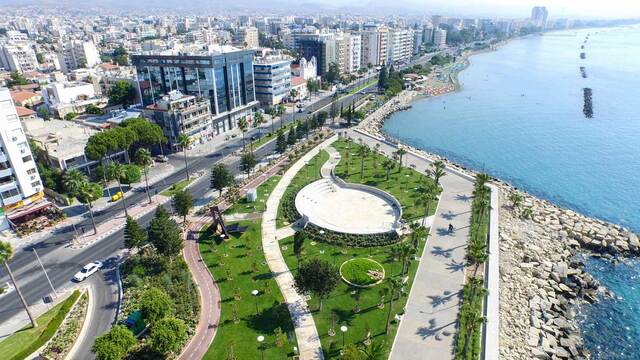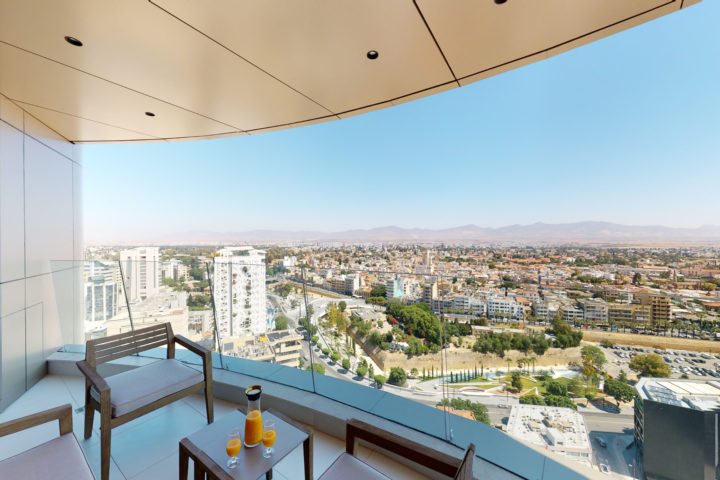On the one hand, there is an evident effort by the Deputy Ministry of Tourism to upgrade the quality of local hotels and entertainment venues, both in terms of upgrading the building quality, as well as the service provided.
However, the same Ministry is encouraging the development of camping in an organised fashion within non-residential areas.
The proposal indicates that these camps should, as a prerequisite, be set up in wooded areas, or within areas which are to be planted by the project developers.
These camp sites place a number of limitations and requirements including the existence (or lack of) a sewage treatment plant, electricity and other public services, as well as parking, fencing all around, as well as security, with a gate.
These sorts of tents, I referred to in previous articles and have recorded their existence (be it so far isolated) in the form of Yurts (Mongolian type tents) and with the ordinary tents as we know from the Arabian deserts by the Bedouins.
There are people who want adventure holidays, in projects set up “in the middle of nowhere” and such type of holiday accommodation can be found in addition to forest areas and those of the isolated deserts, even at the North Pole. On the internet we have discovered such projects in Ghana, Kenya, South Africa, Jordan, etc.
Such “Favela” type of accommodation is to be found nowadays in Cyprus, at the Governor’s beach, the Troodos square, near Trooditissa Monastery and to a lesser extent in the beach localities and specifically in the Polis location near Latchi.
These camp sites are developed in a haphazard manner and they are most disappointing (a visit to any one of them will explain what we say).
Because “This is Cyprus”, even if such projects are allowed, based on the restrictions stipulated, pressure groups and others using our wise MPs, will start pushing for deviation and relaxation to make these projects even more haphazard than what is planned.
So where do you think that these “tourist camp sites” will be located? Most likely in the Troodos region, cutting down pine and other trees, whereas other destinations such as the Pissouri, Pachna, Lofou areas are some of the examples (rich in olive and carob plantations), which will suffer from this ecological destruction.
We will also come to see such favelas appearing near the beaches in areas such as Kiti-Mazotos (Larnaca), Chlorakas-Peyia (Paphos) etc, whereas Akamas is the area which will come under pressure for such developments.
So far, camping in tents is used mainly by local young people with their all-night parties that on some occasions even resulted in crime, whereas the uncontrolled operation created by the residents activities cause bush fires (we have bush fires even for burning of the dry corn, let alone the drinks and souvla barbeques].
On the internet, you will find that there are lovely “igloo” type units in places such as Alaska, Borneo, Costa Rica, etc, but these are isolated projects occupying less that 1% of the total areas not suitable for densely developed Cyprus.
Even if we are to accept (for any reason) this type of development, we should add on the requirements placed by the Ministry, the following:
- Minimum site area 130,000 sq.mts. (net area).
- The upkeep of the existing vegetation and including new plants (of at least 4m height of the type existing in the location, e.g. pines, carob, olive trees under the supervision of the Forestry Department, with their annual permits not to be renewed if the trees are not looked after).
- Existence at all times of a fire protection crew including fire fighting vehicles at all hours.
- Bank guarantee to be in place by the operators for €100,000 at least to ensure the cover of destruction of the trees and the environment by fire or otherwise.
- Existence of private security (one person for every ten tents) at all hours.
Is this an exaggeration? I’m afraid not.
An attempt to build five Yurks in Platres was cancelled after our own intervention, with the District Office not bothering to reply to us. The local council even complained to us that we should have investigated the matter further – which we did and we have a written letter by the council, stating that the cutting down of the pines for the project will be restored (that have not yet been done after four years and the debris are still there). We’re still waiting.
If there is a reason for doing this sort of “development” (which I cannot understand) those at the Ministry of Tourism who have suggested in the past the development of low cost units in agricultural areas, in order for foreign visitors to experience living in an agricultural community and to participate in the potato picking, olives and carobs, should note that this has never happened.
If this sort of visiting experience is a must, why not let the visitors stay in hotels and then visit agricultural establishments in an organised group for certain hours, and not in the scorching 30-40C heat.
I am told that these sorts of things are desperate measures in order to “revive” foreign visitors. Yes, there are similar projects abroad, but we see the results (see Mati at Greece, where 100 people were burned in a blaze due to lack of planning and infrastructure).
The safeguard for such “ideas” is that they are not viable financially, so it will not happen. Instead, we could have other “things to do” when the sun and sea is not there.
See the example of Samos hotels where they have local cooking sessions with the hotels clients participating under the supervision of a local chef, donkey trips for a whole day and overnight stays in a camp, whereas our local wineries will be happy to host such visitors for grape picking and so on.
By Antonis Loizou F.R.I.C.S. – Antonis Loizou & Associates EPE – Real Estate Valuers, Estate Agents & Property Consultants










